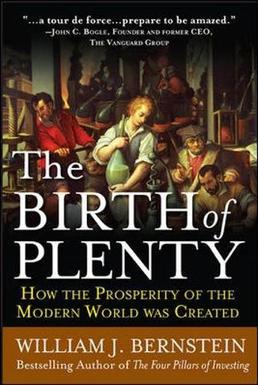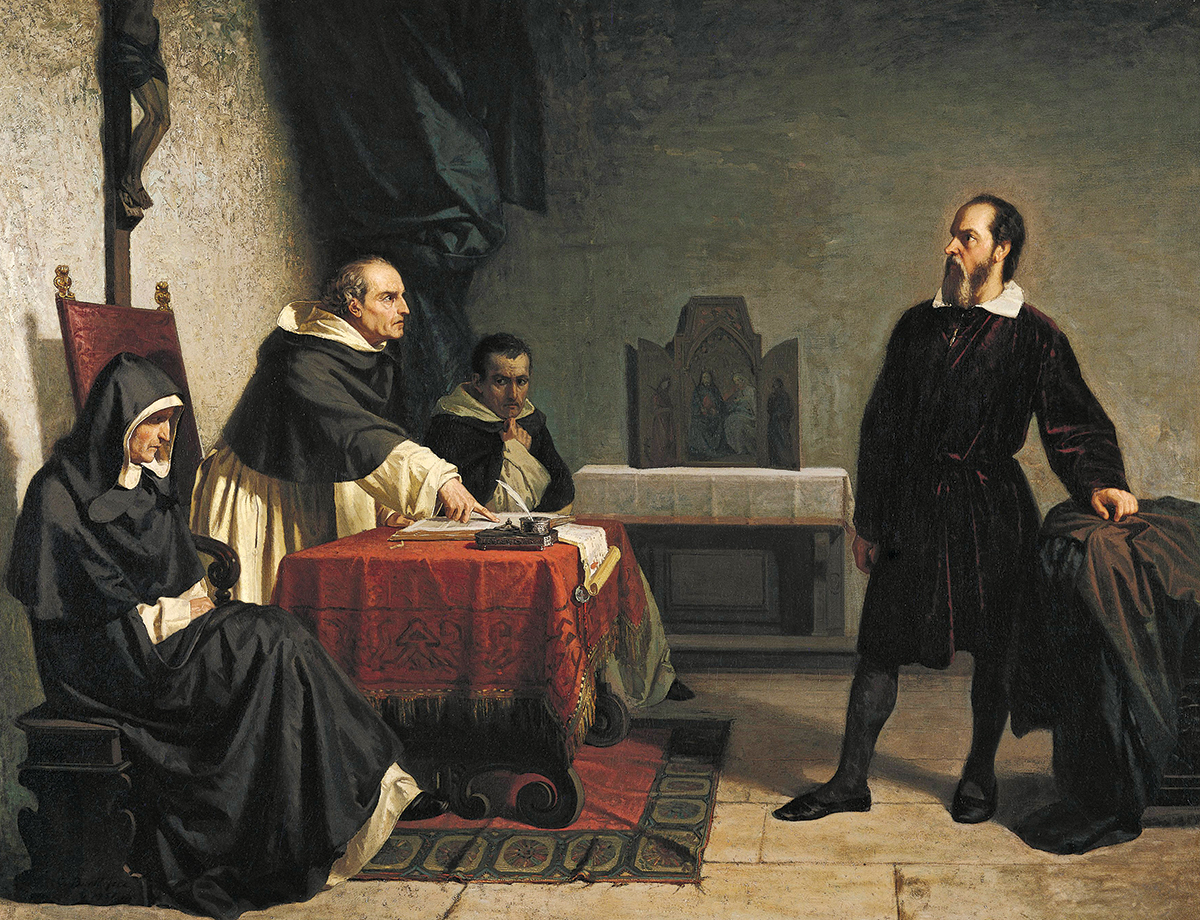
“I will argue that the destinies of nations are determined far more by their economic dynamism than by the vagaries of war, culture, and politics. The current world hegemony underwritten by American military might is no accident. History teaches that the fate of all great world powers is decay and downfall, but this will not occur to the United States until other nations both surpass America in economic productivity and take an interest in projecting power”
“The Birth of Plenty” is a book written by William J. Bernstein. The book explores the processes that have contributed to the enormous increase in human prosperity and living standards over the past two centuries. While the book does not have a single overarching thesis statement, its main argument can be summarized as follows:
The rapid and sustained economic growth that has occurred since the Industrial Revolution can be attributed to a combination of four fundamental factors: property rights, scientific rationalism, capital markets, and communication and transportation infrastructure. Bernstein argues that these four pillars of prosperity have been crucial in driving innovation, entrepreneurship, and economic development.
From The Birth of Plenty:
“PROSPERITY IS NOT ACHIEVED merely by possessing hydroelectric dams, roads, telephone wires, factories, fertile farmlands, or even great quantities of money. Nor can prosperity be transplanted from one nation to another simply by transferring the key components of an economic infrastructure. In all but the most exceptional cases, national prosperity is not about physical objects or natural resources. Rather, it is about institutions—the framework within which human beings think, interact, and carry on business.”

,”
This is an amazing way to look at history.
In our usual perspective, we tend to view past events as if they were part of a narrative, visualizing history as a costume drama with characters much like ourselves. However, many Time-Travel and historic videos often fail to convey just how short and brutal life used to be. A contemporary example that comes close to illustrating this is North Korea.
It’s remarkable how effectively it’s pointed out how primitive life was just around 200 years ago. Back then, the world was a place where nothing could move faster than a running horse, and the only source of light was the flickering flame. For instance, Paul Revere had to undertake his famous ride on horseback because there were no other options available at the time, and the signal that set him on his ride was a simple flicker from a lamp.
And then, seemingly out of nowhere, progress exploded. But why did this happen? The author provides insight into four key processes that are crucial to understanding this transformation. They delve into history and across the globe to test these processes for their explanatory power.”
“Second, innovators must have the proper intellectual tools. Just as the most skilled carpenter is hobbled without his hammer, his saw, or his level, so the inventor is impotent without an effective intellectual model with which to interpret his surroundings. Before about 1600, even the most brilliant Greek, Roman, Chinese, Indian, and European natural philosophers were not in the correct intellectual frame of mind. The soul of Western man lies not in the great literature, art, and architecture that sprang from its Greco-Roman roots, but rather in the simple willingness to subject his most cherished beliefs to the harsh light of empirical scrutiny. Today, this is what truly separates the West from the rest of the world. Glorious as Greek logic and science were, they did not yield easily to the hard facts of the real world, and they reliably failed to provide mankind with useful models of nature.
I have read that the Greek “Intellectuals” despised testing and experimentation. They held it in contempt because it wasn’t pure thought. It was actual physical work fit only for slaves. This is not all that far from Post-Modernism, the “WOKE Mind-Virus,” that has so infected our universities with nihilism.

These people are not staring at a red wall, but at an “art work” in the Metropolitian Museum of Art.
“As you inherit your good looks, brains, and athletic ability to a certain extent from your parents, so does a nation benefit from good institutional “genes.” Where the institutional inheritance has been bountiful—the New World lands settled by England, and in places such as Hong Kong and Singapore, whose citizens drew the common law to their bosom—prosperity has flowed. And where the “genes” have been disadvantageous, as with South America’s dysfunctional Iberian traditions of conquest, gratuitous brutality, religious fervor, and a rent-seeking mentality born of a temporary bounty of mineral wealth, backwardness and poverty have been the inevitable consequences.”
A main point of recommending this work is so that you can grasp, and counter the limitations placed on you by your culture and history.
From The Birth of Plenty :
“A counterfactual analysis in which the Church doesn’t wind up the steward of the Greco-Roman intellectual legacy provides an interesting thought experiment. To its credit, the Church set up the first great European universities in the early medieval period and kept alive the learning of the Greeks and Romans. Without the Church’s protection of this ancient knowledge, the darkness that descended upon the West after A.D. 476 may well have lasted much longer and been far deeper. It is just as easy to make the opposite case—that the Church’s monopoly on academic inquiry strangled Europe’s intellectual development. Without the Church’s dead hand, man might well have walked upon the moon centuries earlier than he actually did.
This is the most important part of The Birth of Plenty, because it is my hypothesis that the Church’s hand is not dead. Don’t confuse this with any spiritual dialogue. Here I am talking only about a Thought-Language, which refers to the rules that govern your thoughts and with which you form a worldview.
Yes, the Church set up the first great European universities in the early medieval period and kept alive the learning of the Greeks and Romans. But it basically hasn’t changed in 1,000 years.

This is Galileo facing the Inquisition.
From The Birth of Plenty
“The scientific method that we take for granted in the modern West is a relatively new phenomenon. Only in the last four hundred years have Western peoples freed themselves from the dead hand of the totalitarian, Aristotelian mind-set. ”
It is easy to get the impression that a switch had been thrown and that the common worldview had suddenly changed. So they are in the process of burning a witch when suddenly they comprehend scientific mythology and put the fire out and release poor Helga. I don’t think so.
And having been to a number of universities I can personally testify that at least half are still thoroughly imbued with an Aristotelian mind set and loathe scientific methodology, or at least are as alienated by it, as their Christian University predecessors.
An example of the primitive thought processes flying in the face of science are the many doomsday predictions we are often presented with, There has been the Y2K Bug, Global Cooling from the 1970s, than Global Warming, and now just Climate Change. These predictions are of course useful to someone’s claim for expertise or power, and often enlarges their bank accounts.
Aligning with a perspective outside the mainstream, consider the act of viewing doomsday predictions from a scientific standpoint. “The World is going to End Soon” is a favored theme among many writers who adhere to a pre-scientific mindset. It garners them attention and a devoted following. This theme conveniently aligns with their quest for expertise or power and often boosts their financial gains.
From The Birth of Plenty:
“Questioning modern economic growth is a treacherous game; in the 1970s, an entire generation of pessimists, led by the Club of Rome, embarrassed themselves when they invoked strict limits to growth as the inevitable consequence of fixed resources.2 Surely, they said, with population growth and limited supplies of land, food, timber, and petroleum, the game must eventually be up. While the Club and its acolytes did Thomas Malthus proud, they ignored the adaptability and creative genius of the human species. When a commodity becomes scarce or expensive, innovators devise better and cheaper substitutes. As recently as a hundred years ago, the only reliable stores of value were property and gold. Over the course of the twentieth century, measures of wealth beyond land and specie appeared, as if by magic. A century and a half ago, serious thinkers predicted that our cities would soon be cast into darkness. After all, the world was running out of whale oil.”
There was an energy crisis! We were running out of firewood and shortly would no longer be able to heat ourselves. Benjamin Franklin solved this with his famous stove.
Let’s close with two current examples. From within the “Church” Claudine Gay recently resigned as president of Harvard, and from the world of Science Elon Musk warns of the dangers of the WOKE Virus.
Claudine Gay mentions “Her truth.” This is how the pre-scientific chattering class brushes aside reality. The point is that her thought processes are the result of a pre-scientific culture that has long sought to subjugate human progress. Think North Korea.
There is a reason there are so many Cyberpunk dystopian novels and movies. It is because so many intuit that we are approaching a cliff edge, but don’t know why, or what to do about it. The Birth of Plenty explains the processes that are brewing a perfect storm, and The Mind of the Martial Artist is what to do about it.
The point is for you to grasp current events not as incidents but as part of processes. Reading “The Birth of Plenty” will enable you to do that as you achieve the Mind of the Martial Artist.
